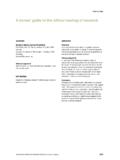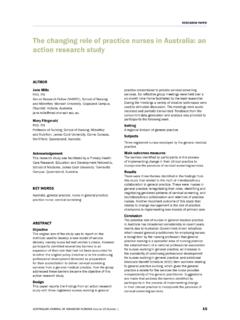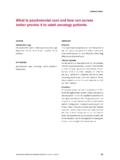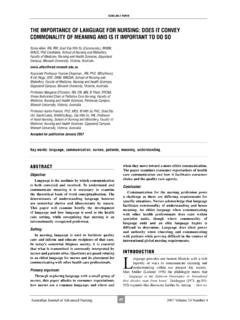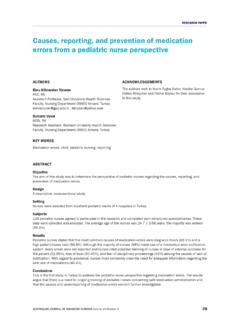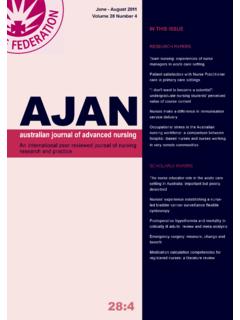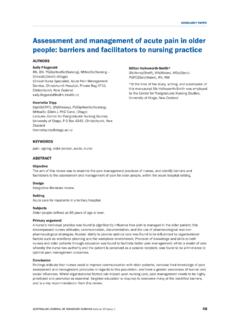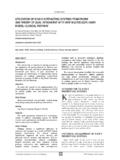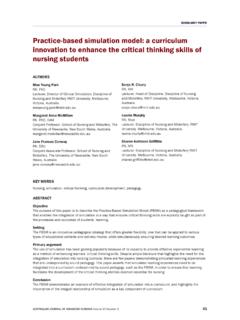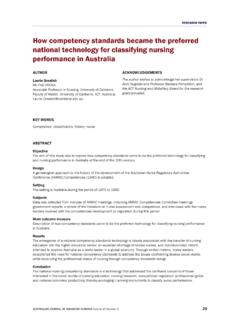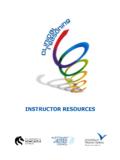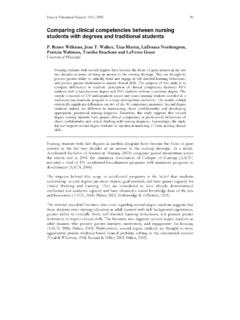Transcription of REGISTERED AND ENROLLED NURSESÕ …
1 24 Australian Journal of Advanced Nursing 2004 Volume 22 Number 1 ABSTRACTR esearch aims: To explore and describe REGISTERED and enrollednurses experiences of ethics and human rights issuesin nursing practice in the Australian State of Victoria. Method: Descriptive survey of 398 Victorian nurses using theEthical Issues Scale (EIS) survey findings: The most frequent and most disturbing ethical issues reported by the nurses surveyedincluded: protecting patients rights and humandignity, providing care with possible risk to their own health, informed consent, staffing patterns that limited patient access to nursing care, the use of physical/chemical restraints, prolonging the dyingprocess with inappropriate measures, working with unethical/impaired colleagues, caring forpatients/families who are misinformed.
2 Not consideringa patient s quality of life, poor working : Nurses in Victoria frequently experience disturbingethical issues in nursing practice that warrantfocussed attention by health service managers,educators and policy at all levels and areas of practice experiencea range of ethical issues during the course of theirday-to-day work. Over the past three decades therehas emerged an impressive international scholarship onnursing ethics offering comprehensive philosophicalcritiques of the kinds of issues nurses face and theprocesses that might be best used for dealing with degree to which nurses are involved in ethical issuesin the work place, how effectively they have been able todeal with them.
3 And the extent to which their formaleducation has prepared them to deal effectively withethical and human rights issues encountered during thecourse of their work has not, however, been systematicallyexplored or enumerated either in Australia or, with rareexception, ethics approval being obtained from theRMIT University Human Research ethics Committee, arepresentative sample of 2329 (3%) nurses REGISTERED indivisions 1, 2, and 3 of the register of the Nurses Boardof Victoria (NBV) was drawn randomly from the NBVdatabase.
4 A copy of the questionnaire together with aletter of invitation to participate and a consent form weredistributed by mail to each nurse on the randomlyselected list. Three hundred and ninety eight completedquestionnaires were returned (response rate =17%). Themajority of respondents were female (92%) and employedpart-time ( ). On average, the respondents were of age ( years), had years of nursingexperience ( years), and had been in their currentposition years ( years).
5 The main areas of practiceidentified were: aged care/gerontology ( ); acutecare ( ); psychiatric/mental health nursing (6%); and,critical care ( ). Over 50% of respondents held agraduate degree/diploma in nursing. Professor Megan-Jane Johnstone, PhD, BA, RN, FRCNA,FCN(NSW), is Professor of Nursing and Director of Research,Division of Nursing and Midwifery, RMIT University, Victoria,AustraliaAssociate Professor Cliff Da Costa, PhD, EdS, MSc, School ofMathematical and Geospatial Sciences, RMIT University,Victoria, AustraliaDr Sue Turale, DEd, MNursSt, BAppSci, DAppSci, RN, FRCNA,FANZCMHN, Director of Nursing, Medea Park Residential Care,St Helens, Tasmania.
6 AustraliaAccepted for publication May 2004 ACKNOWLEDGEMENTSThis research was funded by a grant from the Nurses Board of Victoria (NBV),Melbourne. The views expressed in this report do not necessarily representthose of the NBV. Acknowledgement is due to S. Fry and the Maryland Nurses Association for granting permission to use the EIS survey AND ENROLLED NURSES EXPERIENCES OF ETHICAL ISSUES INNURSING PRACTICERESEARCH PAPERKey words: ethics , human rights, ethical issues, nursingAustralian Journal of Advanced Nursing 2004 Volume 22 Number 1 QuestionnaireAn anonymous self-administered survey tool, the EthicalIssues Scale (EIS) survey questionnaire, originallydeveloped, piloted and validated by Damrosch and Fry(1993) through contractual agreement with the MarylandNurses Association (USA), was used for this study.
7 Beforebeing distributed to the Victorian population, the tool waspiloted using a snowball sample of 40 nurses REGISTERED inVictoria. The purpose of the pilot was to ensure cultural fit with Australian nomenclature and the classification ofnursing positions and areas of work. The pilot confirmed astrong fit with the use of nomenclature with only minoramendments being made. Proposed amendments wereconfirmed with the tool s authors and approved. None of theamendments affected the validity of the tool.
8 Some examplesof the amendments made are: Consulted with the nursesassociation (expanded to include org/union eg. AustralianNursing Federation, Royal College of Nursing, Australia );position classifications expanded to include classificationsendorsed by the Australian Nursing analysis Data analysis was undertaken using the SPSS statistical package. Descriptive statistical analyses wereperformed on the data relating to questions based on threemajor areas. The aim of these analyses was to summarisenurses responses on a number of issues within thesemajor areas.
9 These were: ethical issues in nursing practice: the analysis of the datarelating to questions in this area focussed on finding outwhat issues in their practice disturbed them the most andhow they dealt with them. suitability of education: responses to questions in thisarea were analysed to document nurses existingknowledge and level of their education, together withpotential for educational opportunities in relation toperceived learning needs. workplace support: in this area, the focus of the analysiswas to summarise responses to questions based on theadequacy of workplace resources in dealing with Involvementscore was derived for each respondentbased on responses to questions on ethics and human rightsconcerns in their nursing practice.
10 This score quantifiedtheir level of involvement on these issues in the Sample T-Tests were used to determine whethersignificant differences existed among various subgroups inthe sample on the Involvementscore. Multiple regressionanalysis was used to quantify the influence of the nurses knowledge of ethical issues, their perceived need for ethicseducation in the workplace and the adequacy of resources todeal with ethics and human rights issues in the workplaceon the Involvement comments written on the questionnaires byrespondents were analysed using the qualitative researchtechniques of content and thematic analysis (Patton 2002).
